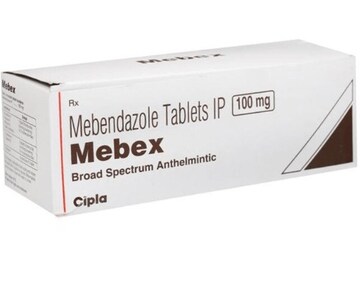Parasitic infections can disrupt your health in a variety of ways, leading to digestive discomfort, fatigue, and nutrient deficiencies. Mebendazole, a widely used anthelmintic medication, is a go-to treatment for intestinal worm infections such as pinworms, roundworms, hookworms, and whipworms. While the drug is known for its effectiveness, a common question that arises is: How long does Mebendazole stay in your system? This comprehensive guide will answer that question in detail while also explaining how the medication works, how it is metabolized, and what factors influence its elimination.
What Is Mebendazole and How Does It Work?
Mebendazole is an oral medication used to treat various parasitic worm infections. It functions by inhibiting the worms' ability to absorb glucose, effectively starving them to death. These dead worms are then expelled naturally from the body through bowel movements. The drug is highly effective and often results in significant symptom relief within a few days of administration.
It is typically administered in a 100 mg dose, depending on the type and severity of the infection. For pinworms, a single dose is often sufficient, while other types of infections may require a multi-day course. The keyword Mebendazole 100 mg is relevant for patients looking to understand the specific dosage that delivers optimal results.
Absorption and Bioavailability
One of the unique properties of Mebendazole is its poor systemic absorption. When taken orally, only about 2-10% of the drug is absorbed into the bloodstream. The rest remains in the gastrointestinal tract, where it continues to act locally against parasitic worms. This limited absorption is beneficial as it reduces systemic side effects and enhances the drug's efficacy within the gut.
The bioavailability of Mebendazole may increase slightly when taken with a fatty meal. However, doctors usually do not recommend altering your diet solely to improve drug absorption unless specified. Most of the time, standard administration practices are sufficient for effective treatment.
Metabolism and Elimination
Mebendazole is primarily metabolized in the liver. It undergoes extensive first-pass metabolism, converting into various inactive metabolites. These metabolites are then excreted primarily through the bile and feces, with a smaller proportion eliminated via the urine.
The elimination half-life of Mebendazole is approximately 3 to 6 hours. This means that within 24 hours of ingestion, the majority of the drug has been cleared from the bloodstream. However, because the drug works locally in the intestines, its effects can continue even after it is no longer detectable in systemic circulation.
Duration in the System
Although Mebendazole has a short half-life, its therapeutic effects can last longer due to its local action within the intestines. Typically, Mebendazole stays in your system for up to 24 to 48 hours. For complete eradication of the worms, doctors may recommend a follow-up dose or a repeated course after two weeks to kill any newly hatched worms.
Because it is poorly absorbed, the duration of its presence in the gastrointestinal tract is more critical than its presence in the bloodstream. The drug continues to act locally as long as it remains in the digestive system, which is usually long enough to treat the infection effectively.
Factors That Influence Drug Duration
Several factors can influence how long Mebendazole remains active in your system:
-
Age and Metabolism: Younger individuals and those with faster metabolic rates may eliminate the drug more quickly.
-
Liver Function: Since Mebendazole is metabolized in the liver, impaired liver function can prolong its presence in the body.
-
Dietary Habits: Taking the drug with a fatty meal may slightly increase absorption and affect the drug's duration.
-
Dosage and Frequency: Higher or more frequent doses may prolong the presence of the drug in your system.
-
Type of Infection: Certain infections may require extended treatment, which can lead to the drug being present in the system for a longer duration.
Safety and Side Effects
Mebendazole is generally well-tolerated, especially because it is minimally absorbed into the bloodstream. Common side effects include abdominal pain, diarrhea, and nausea. Serious side effects are rare but may include allergic reactions or liver enzyme elevations, particularly with prolonged use.
It's crucial to follow the dosage and treatment duration prescribed by your healthcare provider. Self-medicating or extending the use of Mebendazole without medical supervision can increase the risk of adverse effects and resistance.
Drug Interactions
Although Mebendazole has a favorable safety profile, it can interact with other medications. For example, cimetidine, a medication used to treat stomach ulcers, can increase blood levels of Mebendazole by inhibiting liver enzymes. Always inform your doctor about any other medications or supplements you're taking to avoid potential interactions.
When to Seek Medical Advice
If symptoms persist beyond the expected treatment window or if you experience severe side effects, it's important to consult your healthcare provider. A follow-up stool test may be required to confirm the complete eradication of the parasites.
Additionally, reinfection is common, especially in children. Good hygiene practices, such as washing hands regularly, keeping fingernails short, and disinfecting household surfaces, can help prevent recurrence.
Conclusion
Mebendazole is an effective, safe, and widely-used treatment for parasitic worm infections. Although it has a relatively short half-life of 3 to 6 hours, its local action within the gastrointestinal tract allows it to effectively eliminate worms within 24 to 48 hours. The drug is typically administered in a 100 mg dose and has minimal systemic side effects due to its low absorption rate.
Understanding how Mebendazole is metabolized and eliminated helps in appreciating its role in managing parasitic infections. Whether you're taking a single dose or a prolonged course, following your doctor's instructions and maintaining good hygiene can maximize treatment success and prevent reinfection. For those wondering how long the drug stays active, rest assured that Mebendazole continues to work where it’s needed most — in the gut — ensuring a thorough and effective deworming process.
Learn More: Genericcures

